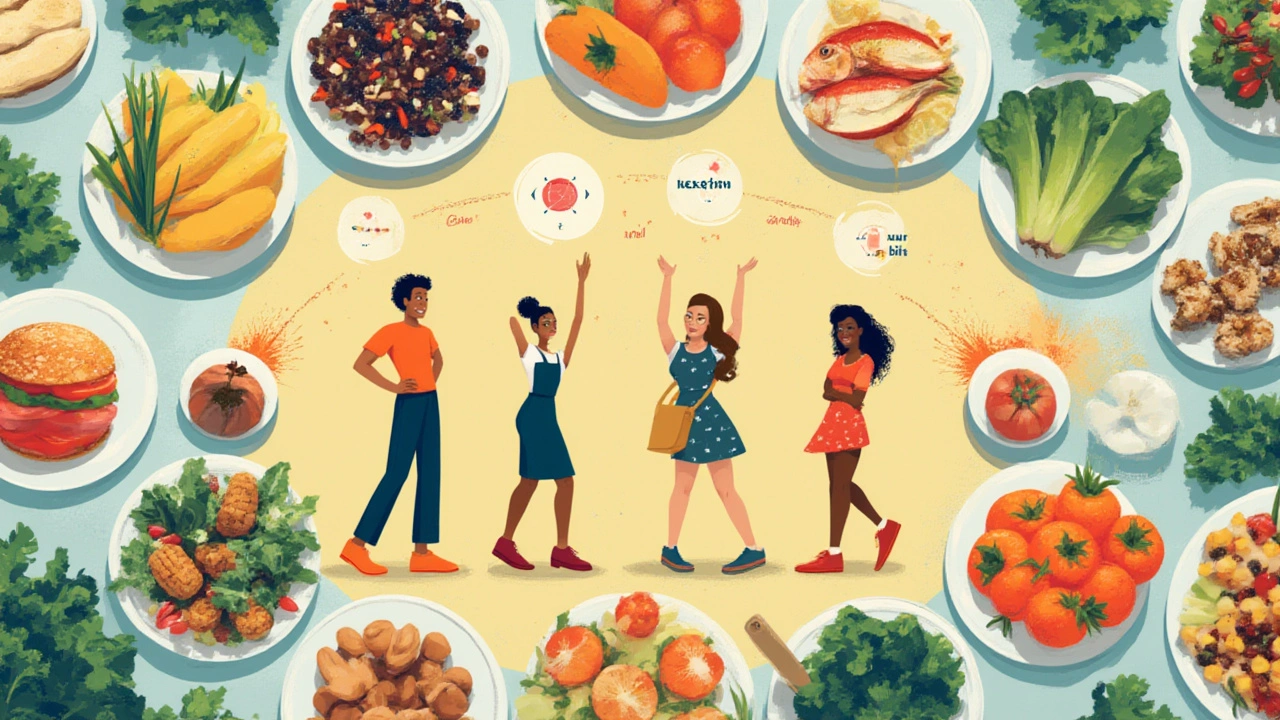You know those days when even your favorite playlist can't snap you out of a funk? Turns out, what you eat could be the real game-changer. The link between food and mood goes way deeper than just loving pizza or craving chocolate ice cream after a tough meeting. Scientists have dug into this for years, and there's a growing pile of proof—some foods truly can tweak your mood, and it’s not all in your head. If you’ve ever wondered why comfort food feels like it hugs you from the inside, you’re about to get some answers. Whether you’re a stress eater or trying to keep your mental edge sharp, the right snacks and meals can make a legit difference in how you feel daily. Let’s break it down so you actually know what to put in your grocery cart next time you want to chase the blahs away.
The Science: How Foods Influence Your Mood
This isn’t just about emotional eating; there’s biochemistry at work with every bite. What we eat directly affects how our brains produce neurotransmitters—the little messengers responsible for stuff like motivation, joy, and even relaxation. Take serotonin, often called the ‘feel-good’ hormone. About 90% of your body’s serotonin sits in your gut, not your brain. That means what you feed your belly can literally change the way you feel, think, and respond to stress. Foods packed with tryptophan—think turkey, eggs, or tofu—fuel serotonin production. Carbohydrates help tryptophan enter the brain, so yes, those mashed potatoes on a gray day really can help you find your smile.
Now, let’s talk about another biggie: dopamine. This neurotransmitter keeps you motivated and focused. Proteins, like seafood or lean beef, contain amino acids your brain uses to make dopamine. In fact, a study in the American Journal of Clinical Nutrition found people who regularly eat plenty of protein-rich foods report better moods and more mental energy than those who skimp. On the other side of the spectrum, people low on certain vitamins—like B12 or folate—often experience more mood swings and even depression symptoms. Leafy greens, citrus fruits, and beans can help fill those gaps. Bonus tip: eating more omega-3 fatty acids, found in salmon and walnuts, can cut your risk of depression according to research published in the journal Translational Psychiatry in 2023. So, food really is fuel for your brain’s happy juice.
But it isn’t just about what’s in your dinner. Blood sugar swings mess with your mood more than most people think. Eating only refined carbs or skipping meals can spike and crash your blood sugar, which is the fast track to irritability, brain fog, and that sudden urge to nap at 3pm. A steady diet with fiber, healthy fats, and complex carbs works wonders for keeping you even-keeled. Here’s a nifty table to show how some top foods stack up when it comes to mood-boosting nutrients:
| Food | Key Mood Nutrient | How It Helps |
|---|---|---|
| Salmon | Omega-3s | Reduces depression risk |
| Spinach | Folate | Supports serotonin production |
| Chickpeas | Tryptophan | Helps make serotonin |
| Bananas | Vitamin B6 | Essential for dopamine synthesis |
| Greek Yogurt | Probiotics | Supports gut health and mood |
When you think about "food for mood," it’s not magic or marketing. It’s your biology—and honestly, it’s kind of amazing how much control you can gain with a simple tweak to your lunch.
Best Mood-Boosting Foods to Eat Regularly
It’s tempting to reach for candy or chips when you need a pick-me-up, but the good stuff for your mood looks a bit different. Let’s get specific about which foods to stack on your plate if you want your brain firing on all cylinders, not just right after a sugar rush but all day long. First up, fatty fish like salmon, sardines, and mackerel. They’re loaded with omega-3 fatty acids that seem to help your brain cell membranes stay flexible and communicative, which is science talk for “your brain works better.” Some folks even call them “happy fish,” and there’s solid research to back up the claim. One analysis in 2024 suggested people who eat fatty fish three times a week report 30% fewer symptoms of depression than folks who rarely eat it.
Now, let’s not ignore the classics—dark chocolate is more than just a guilty pleasure. A square or two (aim for at least 70% cacao) actually triggers your brain to release endorphins, making you feel more content in the short run. Plus, it has antioxidant powers that protect your brain from stress over time. Not into chocolate? No problem. Nuts like walnuts and almonds deliver magnesium and healthy fats, which help stabilize emotions and even lower anxiety levels.
Don’t underestimate what a good breakfast can do either. Oatmeal, eggs, or greek yogurt topped with berries gives you a slow, steady carb release paired with protein, which keeps your blood sugar and your spirits nice and steady. For a snack, grab a banana—its mix of natural sugars and B6 gives your brain a gentle pep without a crash. And let’s give a moment for fermented foods: things like kimchi, sauerkraut, and kefir pack probiotics that communicate with your gut and, in a roundabout way, improve your mind’s resilience to stress. You’ll see people talking about “gut-brain axis” online, and yeah, it’s a real thing. Happy gut, happier mind.
Leafy greens always earn their spot on the list. Kale, spinach, and swiss chard are bursting with folate, which is key for keeping your serotonin topped up—and they fit into almost any meal, whether you’re a smoothie fan or salad meal-prepper. Legumes are another winner: chickpeas and lentils give you not only protein and fiber, but a powerful mood-boosting combo of iron and B vitamins. No wonder Mediterranean diets, packed with legumes, rank so high in happiness studies. So, next time you need comfort, consider swapping out greasy fries for a bowl of lentil soup—your future self (and maybe your friends) will thank you for it.

What to Watch Out For: Foods That Crash Your Mood
Not all foods are on your side when it comes to your mood. In fact, some meals and snacks can quietly sabotage your good vibes without you realizing it. Added sugar is the main villain here. Sure, the energy spike feels great for about 20 minutes, but soon after, you crash—and with it comes sluggishness and irritability. The American Heart Association says most adults eat double the recommended limit for added sugar, which makes mood swings way more common. Energy drinks fall into this trap, too. That combo of caffeine and sugar often leads to jitters followed by anxiety or a crash that’s hard to shake.
Same goes for ultra-processed foods. Stuff like packaged pastries, chips, and fast food mess with gut bacteria and deliver little nutritional value. Several studies, including a big one from 2024 using UK health data, linked regular consumption of these foods to increased depression and anxiety risk. Highly processed carbs—think white bread or sweetened cereals—spike blood sugar fast and drop it just as quick, setting you up for a ride you don’t want. The problem with these foods isn’t just physical; they tinker with brain chemistry, so you feel foggy and less able to handle stress.
Sometimes, trouble comes from what’s missing in your meals. If you’re skipping meals, trying fad diets, or just too busy for real food, your brain can’t get the building blocks it needs for happy hormones. Low iron levels (super common, especially for women and athletes) lead to fatigue and mood dips. Skipping complex carbs in favor of a low-carb or ultra-restrictive diet? You may end up with low serotonin and higher anxiety. The key here is balance: don’t banish whole food groups, and make sure you’re not letting convenience foods edge out the real, mood-boosting stuff your body and mind crave.
Tips for Building a Mood-Boosting Meal Plan
If you’re ready to eat your way to a sunnier outlook, you don’t have to go vegan, swap everything for salads, or break the bank on fancy supplements. Start with a few simple changes that feel doable for your life and taste buds. One of the best places to begin is with breakfast. Choose whole grains (like oatmeal or whole wheat toast), throw in some eggs or nuts for protein, and add berries or citrus fruit for extra vitamins. This combo supports even blood sugar, so your energy and mood stay rock solid until lunch.
Your lunch and dinner plates can use a boost, too. Aim for half your plate with colorful veggies—broccoli, peppers, leafy greens—mixed with a quarter whole grains (like quinoa or farro) and a quarter lean protein. Tuna salad with chickpeas, a brown rice bowl with salmon and greens, or even a veggie-packed omelet give you the variety your brain loves. It’s smart to keep healthy snacks on hand for those mid-day munchies. Try a handful of walnuts, a banana with peanut butter, or carrots dipped in hummus—each option gives you a mix of protein, fiber, and those all-important nutrients for mood.
If you love cozy meals, consider hearty, simple comfort food swaps. Switch out white pasta for whole grain varieties, use olive oil instead of butter, and choose dark chocolate over milk chocolate for dessert. For drinks, try herbal teas like chamomile (great for relaxing) or green tea (for a gentle energy lift). Fermented foods like kimchi, kefir, and yogurt also double up as good breakfast toppers or side dishes, giving your gut and your brain a bonus boost. And don’t forget to eat regularly—even if your schedule is nuts. Set reminders if you need to. Skipping meals makes mood dips more likely.

Food and Mood: The Real-World Payoff
You might wonder if all this theory actually makes a difference in daily life. The answer? Absolutely. People who try the Mediterranean or similar nutrient-dense diets often report feeling less anxious and more resilient after just a few weeks. This isn’t just mind games or the placebo effect. A 2023 clinical trial in Australia found that people who switched to a whole-foods Mediterranean-style diet saw significant reductions in depression severity in only three months—without medication changes. Even small swaps, like adding a serving of greens or choosing brown rice over white, can add up to major mood wins over time.
Parents feeding picky kids have real power, too. Studies suggest children who eat more fruit and veggies, protein, and healthy fats tend to be less irritable and handle stress better. Athletes use nutrition timing (think post-workout protein and slow-digesting carbs) to stave off tiredness and keep motivation high day after day. Office workers who swap processed snacks for nuts or fruit say their afternoon slumps vanish and focus jumps up.
It’s not about eating “perfectly.” Everyone will have days when pizza or fries take center stage, and that’s okay. The secret is setting yourself up for success most of the time with simple, un-fussy, real foods. Feeling off after a weekend of takeout? Start Monday with a hearty oatmeal breakfast and a veggie-packed lunch, and you’ll feel the difference by the afternoon. Next time you shop, grab salmon, sweet potatoes, bananas, spinach, and some dark chocolate. You deserve a little extra happiness, and the right food can help. That’s pretty awesome.

